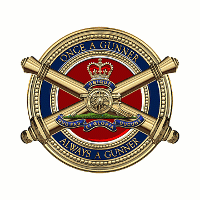In 1961 he was appointed the first Battery Commander of the newly raised 103rd Field Battery, 4th Field Regiment, Brisbane. This battery was destined for service in Malaya and he described this period with the 103rd as ‘the happiest time I spent in the Army’.
On arrival in Malaya with his advance party, the battery came under command of a British artillery regiment. He was determined that ‘103 would beat the Brits at gunnery, movement, deployment and living in the bush’. It proved to be successful in all these areas.
The 103rd was John Salmon’s pride and joy and he worked the men hard with their new 105mm L5 Pack Howitzers deploying by road, Belvedere helicopters, Pioneer fixed wing aircraft and even riverine barges. John Bertram recalls every man in the battery held their heads up high at the first class standards achieved.
Competition continued on the tennis courts when he partnered 17th Gurkha Division’s open singles champion (103’s Lieutenant John Bertram) and won the 1962 and 1963 doubles championships. John Bertram recalls how his BC would bristle when the umpires announced, ‘Next up on the court is John Bertram and his partner’!
Canberra became the next challenge. Promoted lieutenant colonel and appointed to the Directorate of Military Training, John dedicated himself to using his gunnery, instructional and command experience to produce outstanding results. His service in this appointment was rewarded with selection for overseas Joint Services Staff College in the UK.
In 1967, John returned to the Gunner fold as the Chief Instructor and Commanding Officer of the School of Artillery. He was well suited for this appointment and set high standards for both staff and students. This was the Vietnam War era during which courses at the School doubled in number. Nevertheless, the highest of standards were achieved and maintained under his leadership. With John Bertram on the staff as an instructor, the old doubles team was reunited on the Officers’ Mess tennis court. John B recalls the pair competing in the annual officers versus sergeants’ tennis matches which were strongly contested by such other tennis notables as Warrant Officer Geoff Jebb.
Promoted to colonel, John returned to Canberra as the Deputy Director of Staff Duties in Army Headquarters. This area with its precise rules and principles was very much in the mould of JR Salmon. He had high expectations of his staff in this appointment and some found them to be excessively demanding.
The year 1971 saw John as the Chief of Staff at Headquarters Australian Force Vietnam in Saigon. It was a very busy and difficult period as it involved planning for the withdrawal of the Australian force from Vietnam. This required continuous liaison with the senior staff of Headquarters 1st Australian Task Force in Nui Dat.
His excellent service in this role was recognised with the appointment of Commander of the Order of the British Empire (CBE).
On return to Australia John was promoted brigadier and concluded his Army service as the Brigadier Army Reorganisation, attendance at the Royal College of Defence Studies, Director General Coordination and Organisation, and Commandant Joint Services Staff College. He retired in 1982.
He subsequently worked for a number of years as a consultant with Short Brothers plc based in both Northern Ireland and Australia. In those days, his face was seen more frequently in the corridors of Materiel Branch (Army) than when he was serving.
John was able to rejoin Canberra Legacy after leaving the Army and devoted more time to his widows. President of Canberra Legacy Robert Connors said that he was dedicated to, and meticulous in looking after his widows, no less than 14 at any one time. He served five years on Legacy’s Welfare Committee where he made a great contribution; and though suffering health issues in his later years, he continued to deliver button boxes to government departments with the aid of a fellow legatee. In total, John gave 30 years of dedicated service to Canberra Legacy.
John Salmon was as passionate about his sport as his Gunner career. He played cricket, Australian Rules, Rugby, tennis, squash and enjoyed fishing, sailing and horse riding. Don Weir suggests that he spent most time at cricket where he played everywhere he went in Australia, England and Japan. He represented the Australian Army against New Zealand in Japan and on one notable occasion he was struck in the mouth by a particularly nasty ball. ‘Such was his nature that he spat out blood and teeth and continued batting—and made a reasonable score’.
He also competed for the Army in the squash team which won the inaugural competition of the ACT Association.
During his time in Canberra at Army Headquarters, he and David Engel formed the Saturday morning tennis club on the RMC courts. This gave him the opportunity to continue one of the loves of his life—as well as exercising his inimitable authority. ‘White,’ he would say, ‘is the only acceptable colour of dress in the club’ and he insisted on this standard even when he was retired. Garth Hughes recalls the enforcement of this rule, but smiles as he remembers the time when the commandant of RMC arrived for a game wearing black shorts. There was no way that John was going to tell their host that he must wear whites, so an exception to the rule was made that day!
Jim Shelton, when reviewing a draft of this obituary reminded Margie that John was also ‘a very good horseman’.
Of all his sporting activities, some of his happiest days were sailing with Margie. The tranquillity of days broken only by the rushing of water parted by the bow provoked many happy memories.
There was also a dedicated and loving family man behind John’s very military exterior. He married Jennifer in 1956 and they had three children—Jane, Libby and Hugh (deceased). John was deeply saddened by the passing of his beloved sister, Jane and then the mother of his children. He married Margaret (Margie) in 1987 and her children Simon and Letitia extended the Salmon family.
Margie was the most loving and supportive partner for which any husband could wish. They were hospitable and generous hosts sharing their lives with many. Don Weir recalled ‘though he was not a saint and certainly had his share of faults (and detractors) … he lived with these and was fortunate to be loved unequivocally by the loyal Margie whose care during his long illness showed an unsurpassed level of devotion.’
Vale John Robert Salmon—a strong personality, a man of courage, conviction and determination, and all the characteristics of an achiever, which he was. A kind and loving family man; a good citizen and friend; and a Gunner soldier of distinction. Posted to the Great Gun Park up above on 17 March 2013. RAAHC
|


